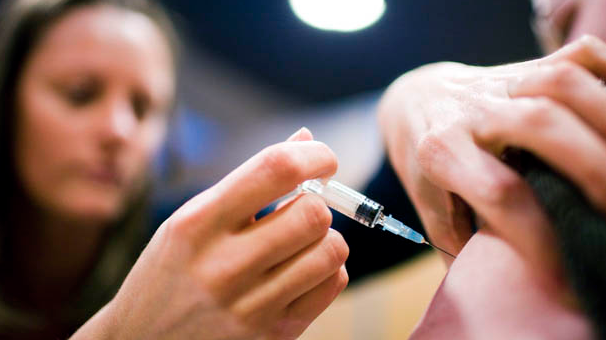In the wake of multiple cases of meningitis B on the University of Wisconsin campus, health officials are holding five days of mass vaccinations.
Even students who have already been immunized with the meningitis vaccine should get protected against a new strain, said Pamela Ann McGranahan, Doctor of Nursing Practice program director and assistant clinical professor at the University of Wisconsin School of Nursing.
UW confirmed in a statement two students were hospitalized with meningococcal disease in October but are recovering. Marlena Holden, University Health Services spokesperson, said although this does not meet the Center for Disease Control’s three person definition of an outbreak, UHS is taking extra precautions to ensure students are protected.
“We really want to protect our population above all,” Holden said. “Because we had two confirmed cases so soon next to each other and other campuses have experienced this, we just knew that it was an essential thing to do to protect our campus.”
Meningitis is the inflammation of brain and spinal cord lining caused by both bacteria and viruses, which in some forms causes serious symptoms including limb loss and death.
The disease spreads through shared oral and nasal secretions, such as when people share a water bottle or chapstick. Though it doesn’t spread easily, it does progress rapidly once contracted.
“It’s an infection that can be really, really scary,” McGranahan said. “Meningitis is not really easy to catch, but when you catch it, it’s really devastating.”
UHS and the nursing school are working together to hold five mass vaccinations on campus at the beginning of cold season. They recommend that all healthy students under the age of 25 get the vaccine.
McGranahan, one of the team coordinators for the vaccinations, said although many people are vaccinated against ACYW strains, the vaccine for the B strain wasn’t available until the end of 2014. The shots are given in two stages spaced 30 days apart. Immunizers will provide both the first shot and the booster over the five days. The booster will later be available at the UHS building.
Although the B serotype is typically only contracted by children under the age of five, older populations are now getting infected.
“Clearly [students] were more susceptible than we realized, or the bug is shifting a little bit, as we see in lots of infectious disease these days,” McGranahan said. “Happily, there’s a new vaccine out that will cover them.”
The mass vaccination will not only immunize many students but may also enhance herd immunity, McGranahan said.
Herd immunity occurs when there are not enough susceptible hosts in an area for the disease to survive and spread.
“You kind of break the train of transmission when you have immunized people,” McGranahan said. “So the goal is to get lots of people immunized.”
Approximately 80 nursing school students and faculty will be immunizing students. The rest of the 340 volunteers, which include first-year students, will greet people and administer health screenings. McGranahan said besides increasing the number of immunized people, the mass vaccinations give the nursing students experience and teach them about their responsibility to the public.
Students can get vaccinated in Gym 3 at the SERF Thursday 11 a.m. to 7 p.m., Friday 10 a.m. to 4 p.m., Tuesday 9 a.m. to 4 p.m., Oct. 26 11 a.m. to 7 p.m. and Oct. 27 10 a.m. to 5 p.m.













